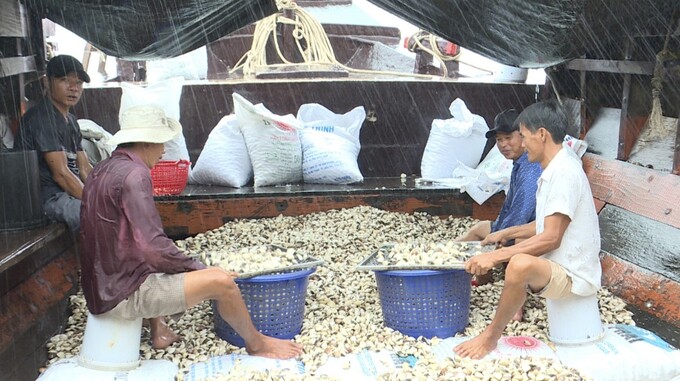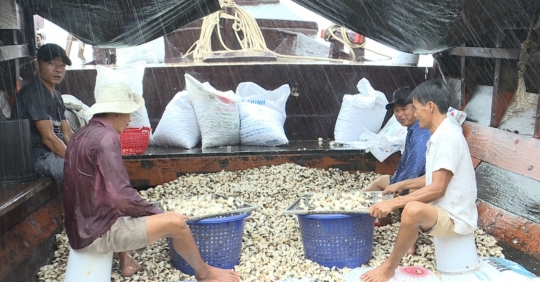On March 15, the Ministry of Agriculture and Rural Development of Tra Vinh, in cooperation with the Center for International Cooperation in Aquaculture and Sustainable Fisheries (ICAFIS) and the Vietnam Trade and Industry Confederation (VCCI), held an awards ceremony for the mussel value chain in the province TraVinh.

The export turnover of the country’s shellfish industry has exceeded 100 million USD. Picture: Ho Thao.
According to an ICAFIS representative, our country has over 3,260 km of potential coastline with many sandy beaches and favorable habitats for mussels to become a national strategic product. Vietnam has exported mussels to 56 markets. The 6 largest import markets for Vietnamese mussels are EU, USA, Japan, Korea, ASEAN and China. At the same time, exports to Korea increased rapidly, exports to ASEAN increased slightly, but exports to China fell.
Although domestic mussel farming has long been developed, it is still mainly focused on the exploitation of semi-diurnal tidal flats due to its convenience to monitor and harvest. In order to develop the mussel industry, it is necessary to develop certification according to ASC standards. This is an international certification for responsibly farmed seafood that minimizes adverse impacts on the environment, ecosystems and communities, and ensures good labor practices.
according to dr Le Thanh Luu, Director of ICAFIS, modern mechanized technology suitable for harvesting and monitoring deep-sea mussel farming will open up a large area for mussel farming in Vietnam. Vietnamese clams, especially Meretrix Lyrata white clams, have great competitiveness in the world market because we have developed agriculture in most coastal provinces and increasingly improved production technology. Vietnamese white clams can process more products than other clams in the world. Deep-sea mussel farming is a great opportunity for Vietnam to expand its acreage and increase production.
The representative of the cooperative was awarded the ASC certificate, the director of Long Thanh Agricultural Cooperative (Chau Thanh district, Tra Vinh), Huynh Van Hoang, stated: “After achieving the ASC certification, many great opportunities have opened up for the cooperative . The certified mussel production and care process is safer and more professional, meeting the needs of the domestic and international market. This will help people in the cooperative to have many opportunities to expand the market, attract many companies to purchase goods, thereby helping the cooperative to actively produce and increase the value of shellfish products not only in the country , but also internationally.
Mr Tran Thanh Dung, Deputy Director of the Ministry of Agriculture and Rural Development in Tra Vinh, said at the ceremony that the mussel industry is currently facing some difficulties, such as: B. insufficient natural seeds, reduced seed quality; Alluvial land has not been formally assigned and is not stable; the product distribution network is not well organized and ineffective; Lack of market information and the possibility of trade promotion is not high. At the same time, mussels are filter feeders, so there are certain risks; There is currently no local mussel processing facility…
In order to develop the white clam industry in Tra Vinh in the long term, the province has transferred the technology of artificial clam seed production and breeding to the cooperative. Simultaneously step up surveillance and alerting to identify safe farming areas. At the same time, the province has also improved trade promotion activities, market research and the system for providing companies with market information. Fisheries departments have actively promoted market information, including prices, production and demand, through the mass media. At the same time, strengthening the links so that cooperatives and farmers have a stable and adequate supply of seeds and consumption.
“We are honored to have received the ASC certificate. In light of this success, the Ministry of Agriculture and Rural Development of Tra Vinh Province suggested that mussel farming households should collectively make greater efforts to maintain and develop the mussel profession in accordance with the ASC Sustainable Agriculture Certification. Also, it contributes to the development of mussels to become a national brand,” said Mr. Tran Thanh Dung, Deputy Director of the Ministry of Agriculture and Rural Development of Tra Vinh Province.
“Vietnam has over 41,500 hectares (as of 2019) of mussel farming with a production of about 265,000 tons/year (mussels 179,000 tons/year). Vietnam’s mollusc products are exported to 50 markets around the world, including some major markets such as EU, USA, Japan, Malaysia, Mexico, Australia… and provide jobs for about 200,000 workers. By 2023, export sales of clams will have exceeded $100 million,” said Dr. Le Thanh Luu, Director of ICAFIS.

